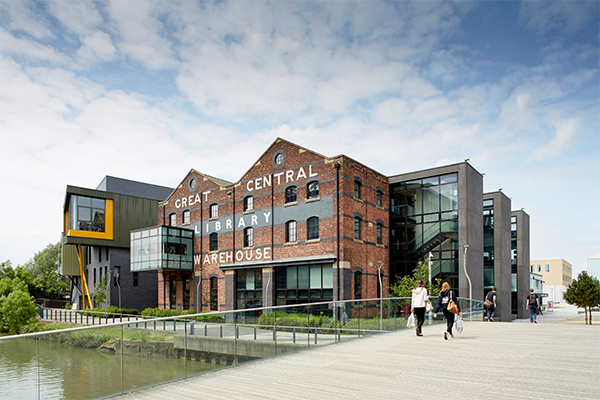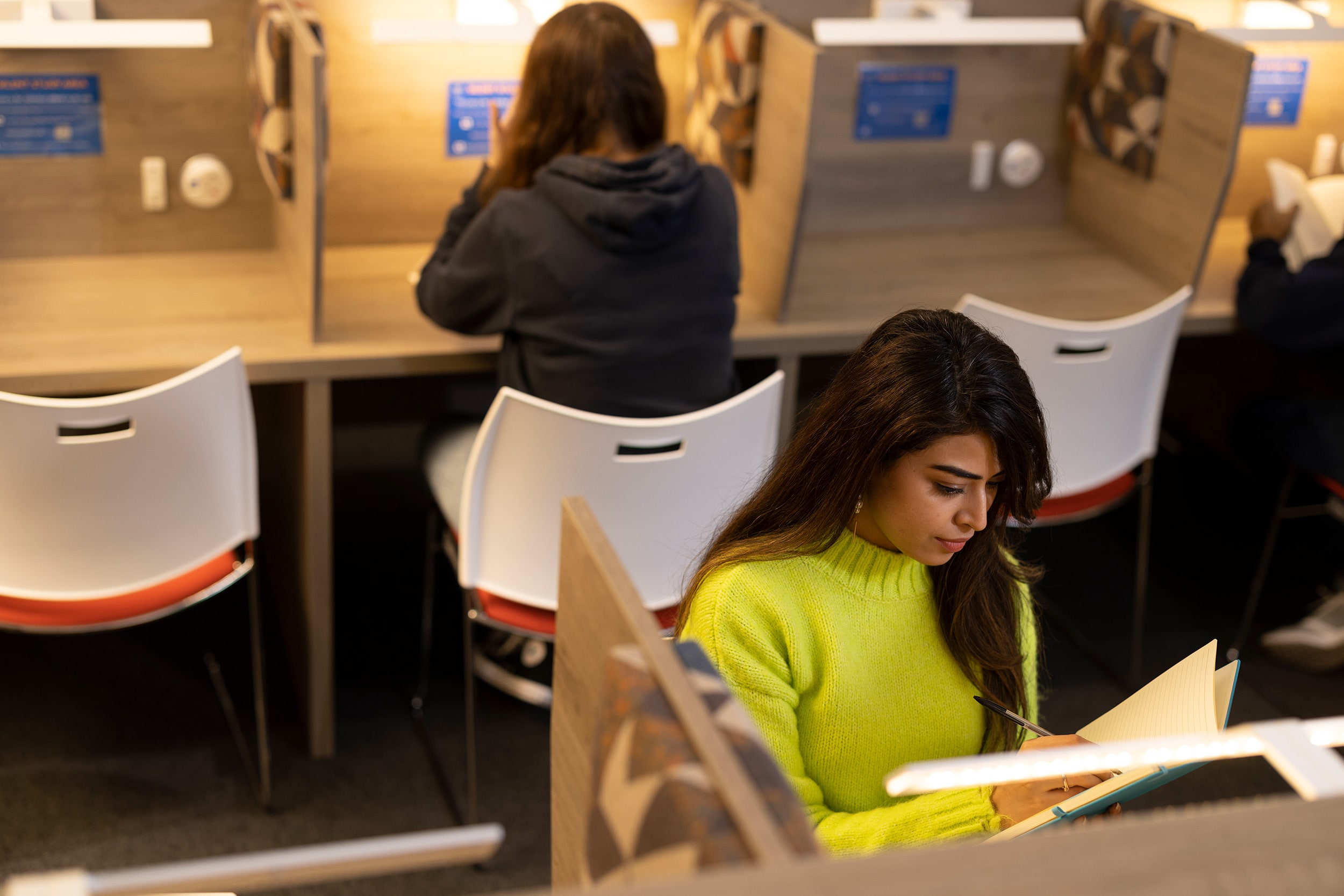Why Choose Lincoln
Opportunities to present research
Wide range of research areas
Complete a research project in a specialist area
Choose from a range of optional modules

From medievalism to twenty-first century literature, this Master's enables students to develop a deeper level of critical understanding, and the opportunity to enhance writing, communication, and research skills.
The programme examines the diversity and variety of the subject and is designed to equip students with the high-level skills necessary for further research or career progression. Optional modules include period coverage from the Medieval period to the Renaissance to the contemporary moment.
Current research in the Lincoln School of Humanities and Heritage has particular strengths in 21st Century literature, 19th Century literature, women's writing, politics, Gothic literature, utopianism, American fiction, eco-criticism, and drama.
Students may benefit from the experience of a range of writers, editors, dramaturges, producers, and directors who visit the University of Lincoln to deliver inspirational talks or masterclasses. Previous speakers include Patience Agbabi, Ann Cleeves, Andrew Graham-Dixon, Chris Packham CBE, Robert Shearman, and the former Poet Laureate Dame Carol Ann Duffy, who became a Visiting Artist at the University in 2015 and regularly visits Lincoln to engage with students and read a selection of her works.
Students can develop their own areas of interest in a particular period, genre, or theme, and are able to gain experience of public speaking by presenting their own research at a symposium at the Wren library in Lincoln Cathedral - a unique opportunity available only to students on the MA English Literature programme.
Opportunities to present research
Wide range of research areas
Complete a research project in a specialist area
Choose from a range of optional modules

The MA consists of 2-hour seminars which run from 10:00am - 12:00pm and 2:00pm - 4:00pm. All teaching is conducted on Wednesdays to allow students to fulfil other commitments.
A series of MA Skills and Careers sessions also run on Wednesdays. These sessions address potential career routes following completion of the MA and also provide a pathway to PhD study.
Students on this course may also have the opportunity to participate in symposia at the Wren library in Lincoln Cathedral, where they can present papers based on their research to current students and staff. Presenting 20-minute papers in panels in a conference-style setting enables students to develop their research skills, preparing them for PhD study and other professional work.
This introductory core module supports students to identify and understand the key themes, debates, and critical approaches currently being explored in contemporary literary studies. It will examine how genres, concepts, and themes transcend particular historical periods and disciplines stretching from the Medieval period to the twenty-first century. Students can develop a critical understanding of literary theory, including the status and practices of the discipline itself. Themes addressed on the module may include: Gender and Representation; Ecocriticism; Politics and Resistance; Medievalisms.
This module explores the representation of haunted locations – of the human experience of environments which provoke, or symbolise, psychological and social disturbances.
Place has always had central significance in the Gothic genre, ‘the literature of nightmare’, which is dominated by desolate landscapes, and claustrophobic interiors. Gothic texts of all periods and cultural contexts use ‘place’ as a trope through which to focalise themes of alienation, repression, monstrosity, and mental fragmentation. These locations work as spatial metaphors, giving form to the fear, violence, and ideological contradictions which haunt the realms which we would prefer to regard as familiar and safe settings for our lives.
This module considers an exciting range of texts (including novels, short stories and films), from the Victorian era to the present day. We consider the way the Gothic genre dramatises anxieties that centre on the home, the city, the railway, the colony/ex-colony, and the frontier. Issues considered through study of these include childhood, gender relations, urbanisation, technology, mental illness, the sublime, constructions of ‘race’, imperialism, and the phenomenon of Gothic tourism with a focus on Lincoln itself.
One of the subjects that literature documents is the relationship of humanity to its environment. In this module we look at literary representations of that relationship from 'ecocritical' and 'post-humanist' perspectives. The first principle of ecological and post-humanist thinking is that other things exist beside humans, and that we are neither so separate from, nor so dominant over, the non-human as Christian and post-Christian Humanism has taught us to think. Since the Enlightenment, much human thought has assumed control of the non-human and has increasingly had only human interests in mind; this tendency has if anything been intensified by the theoretical revolution which has otherwise been so critical of Enlightenment thinking.
Through reading ecocriticial and post-humanist theory alongside primary texts, this module challenges such anthropocentric ways of thinking, which have brought us to our current ecological crisis. We study literature as an exploration and expression of our complex interaction with our environment, from the non-human to the inorganic. Our subject matter will be not just 'nature writing', but also texts in various forms and media, from the ancient to the contemporary, that look very different when viewed without Humanist presuppositions. Overall, this module offers an introduction to developments in literary criticism in the late twentieth- and twenty-first centuries, and challenges students to think about their own relationships with the surrounding world.
This module examines what outlaw figures, and especially Robin Hood, meant to the people of Britain in the Middle Ages, as well as how he was, and still is, connected to history and myth in literature. You can consider the glorification of crime associated with outlaw narratives and the associated resistance of primarily clerical and state authority, as well as the underlying homosocial bonds present in outlaw communities. You are also able to examine other prevalent themes, including human relations with the natural world, gender, religion, disguise and trickery, class, warfare, and weaponry. Finally, you can explore how outlawry and outlaw figures (especially Robin Hood) have been reimagined in post-medieval periods and in modern media. Materials studied range from medieval chronicles, ballads, and dramatic texts to Victorian poetry, children’s literature, film, and television
In the nineteenth century, the novel reached maturity as a form and, arguably, its zenith. This module addresses some of the riches of fiction of this era in which we encounter the roots of our own modernity. Writers turned to the novel to explore pressing social and philosophical concerns in the wake of radical cultural change and a newly empowered bourgeoisie.
Whether they present panoramas of community or focus on the trials and triumphs of a single protagonist, nineteenth-century novels explore the pains and pleasures of the individual attempting to find belonging in an often alienating environment.
While realism is the dominant mode, other generic influences include Gothic, naturalism, expressionism, and satire, and texts include historical fictions as well as those set in the contemporaneous moment. The module takes an international approach, including examples from North America as well as British classics, and potentially works (in translation) from non-anglophone settings including Russia, France, and Scandinavia.
Dreaming of a better life and a better world has been part of the human condition for all of human history, but utopian fiction as a separate and distinct genre is identified with Thomas More’s 1516 text, Utopia, which coins the word ‘utopia’, and is thus often regarded as the foundational utopian text. In this module we identify key features and characteristics of the literary utopia and trace the development of the genre through the twentieth- and twenty-first centuries. The module begins by addressing the classic dystopic texts of the early twentieth century and considering ways in which utopian theory has become the principal vehicle for social and political theory in contemporary fiction. We then reframe some of the ideas explored in the first section of the module by examining the development of the genre in the twenty-first century, discussing contemporary developments such as digital technology, biotechnology, ecofeminism and global humanitarian crises. Authors studied may include: William Morris, Kazuo Ishiguro, Marge Piercy, George Orwell, David Mitchell and Bernardine Evaristo.
† Some courses may offer optional modules. The availability of optional modules may vary from year to year and will be subject to minimum student numbers being achieved. This means that the availability of specific optional modules cannot be guaranteed. Optional module selection may also be affected by staff availability.
We want you to have all the information you need to make an informed decision on where and what you want to study. In addition to the information provided on this course page, our What You Need to Know page offers explanations on key topics including programme validation/revalidation, additional costs, and contact hours.
You can study and research in the University's Great Central Warehouse Library, which provides more than 260,000 printed books and approximately 750,000 electronic books and journals, as well as databases and specialist collections. The Library has a range of different spaces for shared and individual learning.

Specialist areas of staff expertise, include 21st Century literature, postcolonial studies, contemporary politics, renaissance literature and drama, utopian studies, women’s writing (18th Century – present), life writing, American literature, creative writing, ecocriticism, gothic studies, and 18th and 19th Century literature
The MA English Literature programme links to University of Lincoln’s 21st Century Research Group. Kristian Shaw is the research lead for this network and regularly invites external speakers to present on a range of interdisciplinary topics relevant to further study.

The MA English Literature programme features a range of diverse assessment methods including essays, annotated bibliographies, and the presentation of independent research at the Wren library in Lincoln Cathedral.
The University of Lincoln's policy on assessment feedback aims to ensure that academics will return in-course assessments to you promptly - usually within 15 working days after the submission date.
Postgraduate Application Support
Applying for a postgraduate programme at Lincoln is easy. Find out more about the application process and what you'll need to complete on our How to Apply page. Here, you'll also be able to find out more about the entry requirements we accept and how to contact us for dedicated support during the process.

First or upper class second honours degree.
If you have studied outside of the UK, and are unsure whether your qualification meets the above requirements, please visit our country pages: https://www.lincoln.ac.uk/studywithus/internationalstudents/entryrequirementsandyourcountry/ .
Overseas students will be required to demonstrate English language proficiency equivalent to IELTS 7.0 overall, with a minimum of 6.5 in each element. For information regarding other English language qualifications we accept, please visit the English Requirements page.
https://www.lincoln.ac.uk/studywithus/internationalstudents/englishlanguagerequirementsandsupport/englishlanguagerequirements/ .
For further advice on IELTS and the support available, please contact the International College by email at internationalcollege@lincoln.ac.uk.
You will need to have funding in place for your studies before you arrive at the University. Our fees vary depending on the course, mode of study, and whether you are a UK or international student. You can view the breakdown of fees for this programme below.
The University offers a range of merit-based, subject-specific, and country-focused scholarships for UK and international students. To help support students from outside of the UK, we offer a number of international scholarships which range from £1,000 up to the value of 50 per cent of tuition fees. For full details and information about eligibility, visit our scholarships and bursaries pages.
While some of our earlier core texts are available for free online, you will need to purchase copies of most of the primary texts that we discuss in seminars. It is usually possible to source these second-hand and fairly cheaply.
Postgraduate Funding Options
Find out more about the optional available to support your postgraduate study, from Master's Loans to scholarship opportunities. You can also find out more about how to pay your fees and access support from our helpful advisors.

Postgraduate study is an investment in yourself and your future. It can help you to further or completely change your career, develop your knowledge, enhance your salary, or even prepare you to start your own business.
This course is designed to develop strong communication and critical-thinking skills which can be transferable to a diverse range of careers. The programme aims to provide training for roles in journalism, teaching, research, publishing, and media. Students are able to develop skills in research, communication, writing, presentation, and independent learning. Some graduates choose to continue their studies at doctoral level.
The University Careers and Employability Team offer qualified advisors who can work with you to provide tailored, individual support and careers advice during your time at the University. As a member of our alumni we also offer one-to-one support in the first year after completing your course, including access to events, vacancy information and website resources; with access to online vacancies and virtual and website resources for the following two years.
This service can include one-to-one coaching, CV advice and interview preparation to help you maximise your future opportunities. The service works closely with local, national and international employers, acting as a gateway to the business world.
For more information about this course, please contact the Programme Leader.
Dr Alice Crossley
acrossley@lincoln.ac.uk
To get a real feel for what it is like to study at the University of Lincoln, we hold a number of dedicated postgraduate events and activities throughout the year for you to take part in.
